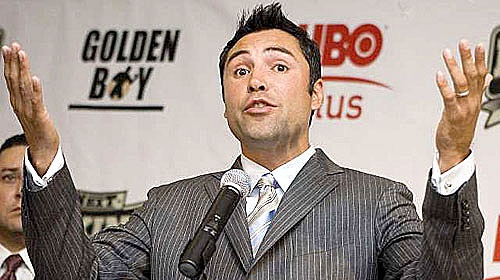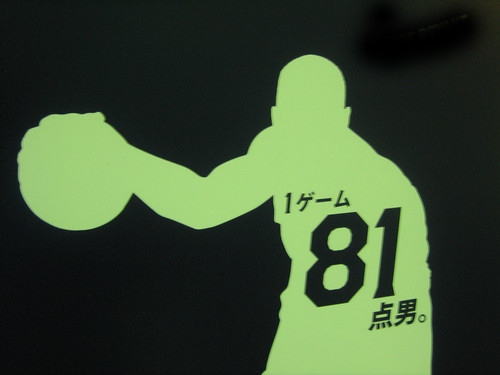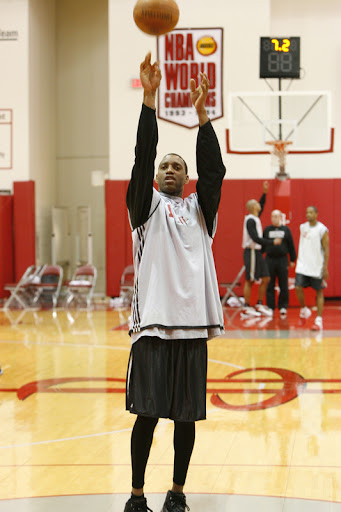
After more than three weeks off, I'm back (not that you ever noticed I was gone). A few rather unconnected (except no.'s 1 and 6) NBA topics that have caught hold of my brain, but I couldn't concoct single articles out of.
1. Kevin Durant's Meaningless BrillianceThe aspect of Durant's game that, while a focus point of praise for him since his days at Texas I still feel is somewhat underrated, is his unbelievable versatility. At UT, Durant got his points pretty much the same way he does now - skilled attacking from the perimeter, with a smooth jump shot. But aside from that, there has been very little carry over. In college, Durant jumped the opening tip and played near the basket on defense, blocked nearly two shots per game, and controlled the defensive glass (11 boards per; he also averaged nearly two steals). He didn't have much ballhandling responsibility, and didn't even bother passing the ball. I'm not saying he was selfish; he was just performing his role, and passing the ball was not one of his responsibilities.
That's why last year, while watching him in an early season tilt against the Clips in LA, when P.J. Carlisemo had him manning the two-spot, I was startled by his very legitimate guard skills: there was one play where he casually dribbled the ball upcourt and initiated the offense, and it didn't seem unnatural at all. And he proved to be a pretty decent passer, and of course he guarded other shooting guards - I'm not saying he did a good job, but all that matters is that he did it. So although as a whole I would say that his rookie year was underwhelming (he didn't have a game with double-digit rebounds
once all of last season), it was still inherently amazing to me.
This year he's only gotten better - late last season he cut back on his three-point attempts, which has continued into this year, only he's shooting them much more efficiently. And P.J.'s ousting and his subsequent move to the froncourt has boosted his rebounding.
But here's the point: How many guys do you know that could go from playing what basically equated to some kind of virtuoso center in college (like Dirk on the 2004 Mavs) to a full-time two/three in the pros? How many? Seriously?
Of course, he doesn't make his team any better, so he's still kind of overrated. Yet highly impressive at the same time.
2. Mayo v. LoveYou know who O.J. Mayo reminds me of? A miniature version of the neophyte Kobe Bryant. No. 1, he's fearless. No. 2, he's a ballhog. No. 3, he's a fierce competitor. And No. 4, he's obsessed with the game of basketball. Like Mamba, his entire life revolved around one day making it to this point, where he would make it to the NBA and be a superstar at the highest level of hoop. Like Young Kobe, Mayo has, ostensibly, a single-minded approach to the game right now - he's still in that phase where his main objective is becoming the best basketball player
he can become, and that does come at the expense of his teammates. But he'll continue to get better and mature, just like Kobe did - and the kid's got superstar written all over him.
His quick jump out the gate has cast a negative shadow over Kevin Durant, the man for whom he was traded for on draft night. Pundits see Love as paling in comparison, and he has fallen under some scrutiny.
But while Love may never develop into a franchise player, like Mayo seems destined to become, we must also realize that this isn't the second coming of Roy for Foye. Love is an extremely gifted rebounder (8.3 per in only 22.7 minutes a night through Saturday), and once he improves the other parts of his game and starts playing more minutes and becomes more experienced, he will average an easy double-double for the next 15 years - I'm talking something like 15 and 13 - and he's going to help a good team win basketball games one day.
I'd take Kevin Love and his future any day of the week.
3. LeBron v. KobeHas LeBron James surpassed Kobe Bryant for title of Best Basketball Player in the World? In a word, yes, and I'm from Los Angeles. LeBron has added some Kobe to his game this year - he's diversified his offensive portfolio, implementing an improved mid-range jump shot and some pretty slick one-on-one moves to the greatest power game any wing player has ever had. And he's become an absolutely devastating man defender, having on several occasions already this season taken elite opposing small forwards completely out of the game offensively.
To wit:
12/5 v. Indiana: Granger 2/7 FG, 4 Pts
12/19 v. Denver: Melo 5/14 FG, 13 Pts
1/09 v. Boston: Pierce 4/15 FG, 11 Pts
1/13 v. Memphis: Gay 5/18 FG, 10 PtsPut more simply, Kobe Bryant has never dominated basketball games on both ends of the court, for 48 minutes, on a consistent basis, like LeBron is doing this season.
Of course, this is no knock on Mamba. We all knew that LeBron would one day catch and then pass Kobe as the game's top player. It was inevitable. But Kobe is more dangerous than ever. He doesn't have the same bounce he once had, but he's crafty as hell and I think he's the second best shooter in the game, behind Dirk. What other NBA player is better shooting from all over the floor, with a hand in their face? Think about it for a second. No one. And as the great Mark Heisler once noted, there's nothing more important in basketball than the ability to shoot. When MJ came back for the first time, no longer an acrobat at 32, he was, as Heisler called it, a "Larry Bird-level shotmaker," which made him better than ever. Think of Kobe the same way.
Furthermore, the man is so lethal at the end of games that it's almost spooky, even scarier than it was before. We're lucky he always wanted to play basketball; if he weren't in the NBA, his famed "killer's instinct" might be manifesting itself in the form of actual murder. By far, he's still the guy you'd want at the end of a game.
4. Pau GasolI've been thinking about this one.
Doug Collins wondered during TNT's MLK day broadcast of the Lakers and Cavs, "Is there a more skilled big man than Pau Gasol?" Immediately, I considered Duncan, whom I think is better with his back to the basket because he's stronger and can always get the position he wants. Gasol can't; he's not strong enough or physical enough. But then again, you could make the argument that that has nothing to do with skill.
And so Gasol may be the game's most skilled big. He's an almost automatic mid-range and faceup jump shooter - even better than TD, believe it or not. And he's just got a ton of finesse moves: a spin move, hook shots, short turnarounds, fakes, you name it. He can finish around the hoop with either hand and is one hell of a passer. So, yeah. Pau Gasol. Might be the game's most skilled big.
5. Greg OdenNot to infringe on Simmons' territory here, but I watched the 2007 NCAA Championship game with my dad, and we both marveled at Mr. Oden's body and athleticism, which reminded both of us of a young David Robinson. He shredded Florida's big man threesome of Joakim Noah, Al Horford, and Chris Richard (about as mighty a trio of college big men as you'll see on one team) to the tune of 25 points and 12 rebounds in a truly awesome performance (even though they lost). That night, I became convinced that Oden was the next great NBA center.
But then he hurt his knee, and not only has it created serious doubts that he'll ever stay healthy as a pro, but, at least so far, it seems to have robbed him of the explosiveness that once made him such a freak of nature (which microfracture surgery is known to do, of course). Dude's a monster - a legit 7-1 (I'm not sure if he's grown any since college, but it looks like he has), and he's bulked up since his one season at OSU: he was ripped as a Buckeye, now he's just big. So he's still a man amongst boys around the basket. But I've yet to see any flashes of a young D-Rob from him this season; he just doesn't have the same turbulence . Maybe it's gone for good, maybe he'll get some of it back, like Amare has. Suffice it to say I'm disappointed by the whole ordeal.
Furthermore, he can't stay on the court even when he's able - he's always in foul trouble. He and Andrew Bynum have a lot in common. I know he's only a rookie and I know he hadn't played organized ball in a year, but even with that being said, is it too much to expect a 15-9-2 from a guy who was compared to Bill Russell, no excuses and no questions asked?
He's averaging 14.9 points and 11.2 rebounds in games that he played more than 30 minutes, so we know he can play, but he's only played in
nine such games out of 37. He's got to do better. 9 points and 7 rebounds a game is not cutting it.
I know the previous four paragraphs have been rather negative, but I sincerely hope, I sincerely
want for this guy to pan out. I know it's unrealistic, but I want every NBA player to realize his potential, especially one that once looked the future centerpiece of five NBA championship teams.
6. How much should winning matter when you're determining All-Stars?Inspired by this past Thursday's edition of the NBA on TNT (featuring an Emmy-worthy guest appearing from "The Glove" himself, Gary Payton). So, just how much should team success factor into this individual honor? Personally, I think to try and argue that record is irrelevant in the matter is absurd. It's okay to have a couple guys from poor teams fill out the All-Star rosters, but there should never be more than a couple, and they should never start.
For example, GP thinks Al Jefferson should start at forward for the West (over Tim Duncan, for the love of God). One huge problem here: even after winning nine of their last eleven, Big Al's T'Wolves are still only 15-27. If Jefferson were really the kind of guy that should be starting in the All-Star game, would his team be 15-27? Of course not. Remember KG in Minny, T-Mac in Orlando, and AI in Philly? All of those guys took below average teams and, by virtue of their skill and will, made them at least average. And in the years that those players were on teams that were well below .500 at the break (like McGrady in 2004), guess what? They didn't deserve to start. Period.
So sorry Big Al, sorry Danny Granger, sorry Chris Bosh (having something of a fluke year because he's a franchise player), and last but definitely not least, sorry GP. I never meant to hurt you.

















